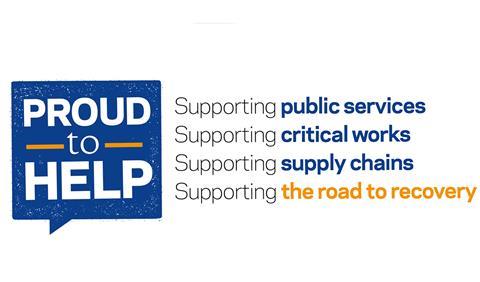Proud to Help: Negative press during the lockdown should not overshadow projects that are so vital to this country’s future


Like everyone else, all those working within the construction industry are facing uniquely challenging times during this age of coronavirus. The government’s call for construction sites to remain open, echoed loudly by the Construction Leadership Council (CLC), has been diluted by contrary positions in Scotland and Northern Ireland (where construction policy is a devolved responsibility) and by the unhelpful interventions of the mayor of London (where clearly it is not).
Hindered by this uncertainty, the government’s consistent message of construction work continuing, which many feel has come across as a whisper in the face of so many competing priorities, has been loudly shouted down by the media and the court of public opinion.
The impact of this is that the latest Barbour ABI covid-19 research, published on 17 April, shows that the number of construction projects now delayed continues to increase (more than 4,500 projects are stalled - up 200 from the week previously - having a value of over £70bn, up by £2.4bn over the past week).
>> Reader survey: how is the continuing lockdown affecting your business?
>> Jenrick pledges to continue cladding work despite lockdown
A Eureka Research report, published on the same day, measuring the impact of covid-19 on the plumbing and heating sector, found that it is operating at 13% of normal capacity and that each day of the lockdown equates to £47m of lost business (so far amounting to £1.1bn and counting).
The NHS and social care workers are on the front line but if that wartime analogy is continued it is construction that is backing up these vital services, akin to the Royal Engineers
The housebuilding sector is virtually at a standstill and builders’ merchants are reportedly operating at about 10% capacity. The age of coronavirus is tunnelling a gaping hole through the industry, as it is through the entire global economy.
Despite all of this, some sites are continuing – according to the Barbour ABI research, infrastructure and, unsurprisingly, medical facilities are accounting for the majority of ongoing construction work. It was, of course, the construction industry that transformed major exhibition centres into huge hospital wards (the NHS Nightingale Birmingham was delivered in seven days; the Scottish Events Campus has also been turned into the NHS Louisa Jordan in just a week).
The NHS and social care workers are on the front line but if that wartime analogy is continued it is construction that is backing up these vital services, akin to the Royal Engineers, building vital logistical and infrastructural support. Although emergency call-outs in plumbing and heating are only at 50% capacity, it is plumbers, heating and gas engineers, electricians and other tradesfolk that are braving the risk of infection (often without adequate PPE) to fix emergencies in people’s homes during this lockdown.
It is, of course, essential that any construction activity can take place safely, in accordance with Public Health England guidelines and the Site Operating Procedures that have been published by the CLC (version 3 was published on 14 April). To help understand how to work safely, the Construction Industry Council has adopted a short, explanatory digital film, produced by Langley Waterproofing Systems Ltd, which is available to view on the CIC website: another example of industry collaboration in these challenging times.
The CLC is working up a strong and robust programme of policies that will support the recovery and get the industry back to better health as quickly as possible
It is a regrettable but undeniable fact that many companies will cease to trade as a result of this crisis (the early months of the recovery will be especially dangerous for the supply chain with cashflow dangers inherent in getting back to work with 60-day payment terms) and many people will lose jobs (and apprenticeships) in an industry that will count itself very fortunate to shrink by only 10%.
Under the leadership of Andy Mitchell and Mark Reynolds, the CLC has really stepped up to the plate during this crisis, collaborating with the other major industry bodies – such as the CIC, Construction Products Association and Build UK – to provide strong market intelligence and advocacy reaching into the heart of government on a daily basis. The CLC is working up a strong and robust programme of policies that will support the recovery and get the industry back to better health as quickly as possible. And, even more importantly, government is listening with key civil servants attending the daily conference calls, alongside regular sessions with the construction minister, Nadim Zahawi.
In a recent radio phone-in, a listener asked, with some sarcasm, if building warehouses was considered to be essential work. Leaving aside the fact that no construction work can be carried out at home and therefore the issue of ”essential work” does not apply, it was ironic that another caller on the same programme raised serious concerns about food shortages and the lack of opportunity for people to receive online shopping deliveries. No-one, least of all the radio presenter, seemed to recognise the irony in that juxtaposition of complaints. A huge market increase in online deliveries requires a comparable expansion of warehouse space and how is that delivered? In this, as in so much else, it is the construction industry that is proud to help.
Graham Watts is chief executive of the Construction Industry Council, as well as director of the Considerate Constructors Scheme, Constructionarium and the CIC Approved Inspectors Register. He is a member of the CLC Covid-19 Industry Task Force and convenes its health and safety sub-group
Tell us about the projects that make you proud to help
Building has launched its Proud to Help campaign to highlight all the work construction is doing to support the country’s public services, critical works and supply chains, as well as setting it back on the road to recovery. Contact us at newsdesk@building.co.uk with the subject line ‘Proud to help’ or via LinkedIn or Twitter with your #ProudtoHelp stories




























1 Readers' comment